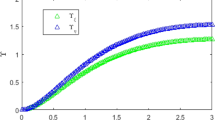Abstract
The fundamental solution of the two-dimensional convection–diffusion equation with variable coefficients and its adjoint equation are obtained in complex form in terms of the unknown density of two equivalent uniquely solvable Volterra integral equations of the second kind whose analytical solutions are given explicitly as convergent Neumann series. The Volterra integral equations are obtained by integrating the complex form of the original differential equations, without additional change of variables as proposed by previously authors. In the numerical examples, cases corresponding to non-self-adjoint operators are considered. As a validation, the proposed approach is used to derive the fundamental solution of the adjoint to the convection–diffusion equation with constant velocity. In this case, the series solution can be evaluated analytically. For more general velocity fields, the recursive terms of the series can be evaluated by symbolic computation or numerical integration.
Similar content being viewed by others
References
Courant R, Hilbert D (1953) Methods of mathematical physics, vol I. Interscience, New York
Wrobel L and DeFigueiredo DB (1991). Numerical analysis of convection–diffusion problems using the boundary element method. Int J Numer Methods Heat Fluids Flow 1: 3–18
Clements DL (2004). A fundamental solution for linear second-order elliptic systems with variable coefficients. J Eng Mathematics 49: 209–216
Vekua IN (1967). New Methods for solving elliptic equations. North-Holland Publishing Company, Amsterdam
Garabedian PR (1964). Partial differential equation. John Wiley and Sons, Inc., New York
Bergman S (1969). Integral operators in theory of linear partial differential equations. Springer Verlag, New York
Hill MG and Porter D (1986). The numerical determination of fundamental solutions of elliptic equations. IMA J Numer Anal 6(6): 405–420
Hill MG, Riley N and Morton KW (1986). An integral method for subcritical compressible flow. J Fluid Mech 165: 231–246
Hill MG and Riley N (1986). A hybrid method for transonic flow past multi-element aerofoils. J Fluid Mech 170: 253–264
Young DL, Chang TJ and Eldho TI (2002). The Riemann complex boundary element method for the solution of two-dimensional elliptic equations. Appl Math Model 26: 893–911
Iserles A (2004). On the method of Neumann series for highly oscillatory equations. Bit Numer Math 44(3): 473–488
Okamoto N (1988). Analysis of convection diffusion problem with first-order chemical reaction by boundary element method. Int J Numer Methods Fluids 8: 55–64
Author information
Authors and Affiliations
Corresponding author
Rights and permissions
About this article
Cite this article
Castillo, M., Power, H. The Neumann series as a fundamental solution of the two-dimensional convection–diffusion equation with variable velocity. J Eng Math 62, 189–202 (2008). https://doi.org/10.1007/s10665-007-9198-7
Received:
Accepted:
Published:
Issue Date:
DOI: https://doi.org/10.1007/s10665-007-9198-7




